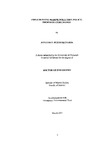Implementing marine pollution policy : proposals for change
| dc.contributor.supervisor | Glegg, Gillian | |
| dc.contributor.author | Richards, Jonathan Peter | |
| dc.contributor.other | Faculty of Science and Engineering | en_US |
| dc.date.accessioned | 2011-05-11T13:25:31Z | |
| dc.date.available | 2011-05-11T13:25:31Z | |
| dc.date.issued | 2001 | |
| dc.identifier | Not available | en_US |
| dc.identifier.uri | http://hdl.handle.net/10026.1/389 | |
| dc.description.abstract |
This study aims to determine the factors that affect the implementation of marine pollution policy, especially with regard to regulation of the hazardous substances which contaminate the marine environment- The purpose is to identify weaknesses in the current regulatory regime and to propose improvements. The study also aims to develop a new strategic framework for the implementation of the recent international policy commitments, which call for the complete cessation of discharges of hazardous substances into the marine environment by the year 2020. Furthermore, the study seeks to provide evidence to support or challenge current theories relating to regulation and policy implementation. Examination was made of the attitudes of environmental managers from the UK chemical industry and inspectors from the environmental agencies towards the regulatory system. These are the key personnel who operate at the regulatory interface where the policy outcome is determined. The methodology combined both qualitative and quantitative techniques. Structured interviews helped define the issues for subsequent investigation using a questionnaire survey which was sent to over 700 key personnel. Focus groups were then used to explain the survey findings and develop solutions to key regulatory problems. Statistical analysis of the survey response data revealed similarities and significant differences between the views of industry and the regulator on the effectiveness of the current Integrated Pollution Control regime. The strength of the system was perceived as its practical and pragmatic approach, coupled with a convenient and familiar bureaucracy. The weaknesses identified related to the derivation and enforcement of standards. The Environmental Quality Standards system, which underpins the regime, was acknowledged to be flawed by both operators and regulators who agreed it should be improved by the expansion in the number of priority listed chemicals, the introduction of sediment Environmental Quality Standards and Direct Toxicity Assessment of effluents. Focus groups supported the expansion of the system, but recognised that it would create a regime that was both complex and impractical. The findings were used to construct a revised model of the existing regime. Multivariate analysis of the industry response data identified 3 cluster types and significant differences were revealed between their knowledge of policy developments, their implications and the need for changes to the current system of hazardous chemical control. Operators and regulators acknowledged the existence of the mutual interdependency which has created and maintained a tight policy network (community) at the regulatory interface. Further evidence to support the existence of this community and of regulatory capture, was provided by the study data. Focus group discussions also identified the requirement for a more fundamental reappraisal of the regulatory system in order to deliver the OSPAR strategy. A new regulatory model, which incorporates process and product substitution, is proposed as a strategic framework to ensure that future policy commitments are implemented. This approach may lead to the opening up of the current tight policy network with resultant benefits for policy implementation and reduced regulatory capture. The new model could be applied by other countries within the OSPAR region and in other regions of the world, in order to improve environmental protection. | en_US |
| dc.description.sponsorship | the Natural Environmental Research Council and the Greenpeace Environmental Trust | en_US |
| dc.language.iso | en | en_US |
| dc.publisher | University of Plymouth | en_US |
| dc.subject | Nuclear waste reprocessing | |
| dc.subject | Environmental law | |
| dc.subject | Environment | |
| dc.subject | Marine Pollution | |
| dc.subject | Pollution | |
| dc.subject | Nuclear waste | en_US |
| dc.title | Implementing marine pollution policy : proposals for change | en_US |
| dc.type | Thesis | |
| dc.identifier.doi | http://dx.doi.org/10.24382/3596 |
Files in this item
This item appears in the following Collection(s)
-
01 Research Theses Main Collection
Research Theses Main


